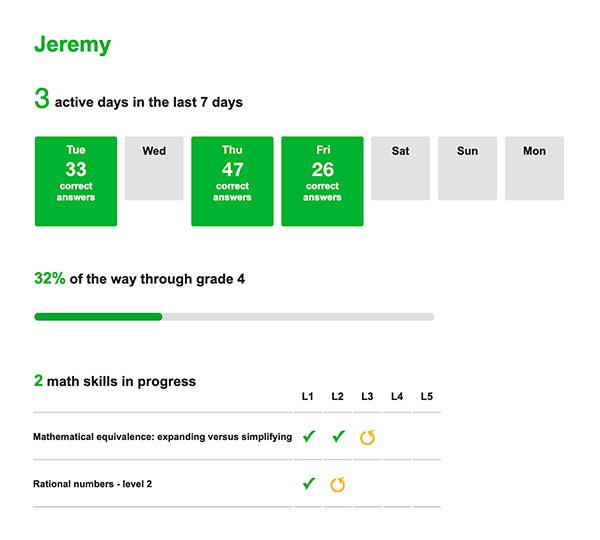Real K-5 math support ➔ for a fraction of the cost of traditional tutoring
Need financial assistance?
Apply for a scholarship >>
"
We were having a hard time finding a good tutor for our son. After going through two math tutors that didn't work out, we tried Grokkoli, and honestly, it did a far better job than the tutors we'd previously hired.
Read more >>
Dennis
Father of two in San Ramon, CA
"
I have two young kids, and the results were incredible. I watched with amazement as my 7 year old daughter learned the concept of decimals and adding fractions with no assistance from me whatsoever.
Read more >>
Vanessa
Mother of two in Toronto, Ontario
"
Grokkoli has been a gift to me AND my child. Her confidence in math has grown "exponentially". In just 10 weeks, she has advanced tremendously in her understanding of math.
Read more >>
Jasmine
Mother of two in the BC Interior
Helpful features for parents
Learning-progress dashboard
- See how quickly your kids are learning
- See which skills Grokkoli is reinforcing with your kids
- See which skills your kids are struggling with
Question-by-question learning session recaps
- See exactly where your kids are experiencing difficulties, and how Grokkoli adjusted to help them
Email notifications you control
- Receive learning-session summary emails, weekly learning-progress emails, and more
- You decide which emails you want to receive

Frequently Asked Questions
-
1. Why do you need my credit-card information?We ask for your credit card information (or other payment method) to verify your identity and ensure an adult is involved in all learning-plan creations on Grokkoli. We also want to make sure that we comply with the Children's Online Privacy Protection Act (COPPA) and similar regulations in other jurisdictions. You will not be charged for anything during your 7-day free trial.
-
2. Can I change my learning-plan or cancel at any time?You can change your learning-plan level at any time, and the change will take effect at the start of the next billing cycle.
-
3. What happens if I cancel my learning-plan mid-billing cycle?Your child will continue to have access to Grokkoli until the end of the cycle. You can cancel anytime during the 7-day trial period without incurring any charges.
-
4. How does your 3-month learning-challenge work? What are the exact terms of the reimbursement, and how will you determine how much progress a learner has made over that time-period?The learning-challenge is quite simple ➔ commit to regular learning-sessions on Grokkoli, and if you don't see rapid progress in just 3 months, we will reimburse you.
Unlike other services offering similar kinds of guarantees but with a long list of requirements, we only require that your child use Grokkoli for minimum of 75 minutes per week. We recommend 4-5 sessions lasting between ~15-25 minutes each spread out through the week to maximize learning (and our fastest learner yet completed all of Grade 2 in just 6 weeks by doing 5-6 sessions per week, each lasting ~20 minutes).
As for determining how far your child has progressed, Grokkoli's math-content is aligned to US common core standards, so our calculations will be based on where they end up in the curriculum compared to where they started off. (For example, a learner might start off roughly 25% of the way through the grade 2 curriculum, and end up 50% of the way through the curriculum for grade 3 ➔ this would represent 1¼ grade-levels of advancement). Grokkoli doesn't advance learners unless they demonstrate clear mastery of skills already covered, so their progress on Grokkoli is an excellent indicator of the gains they've made.
Regarding children with special needs: Children with all variety of challenges (dyslexia, dyscalculia, ADHD, level-2 autism, and more) are using Grokkoli to significantly accelerate their math learning. While most progress similarly to their peers (learning 3-4x faster than regular schooling), we anticipate this may be challenging for some to sustain, particularly for those whose challenges are severe. Nevertheless, we will continue to honor this guarantee, regardless of the level of difficulty a child faces. -
See more questions about how Grokkoli teaches math.
-
Still have questions? Contact us here